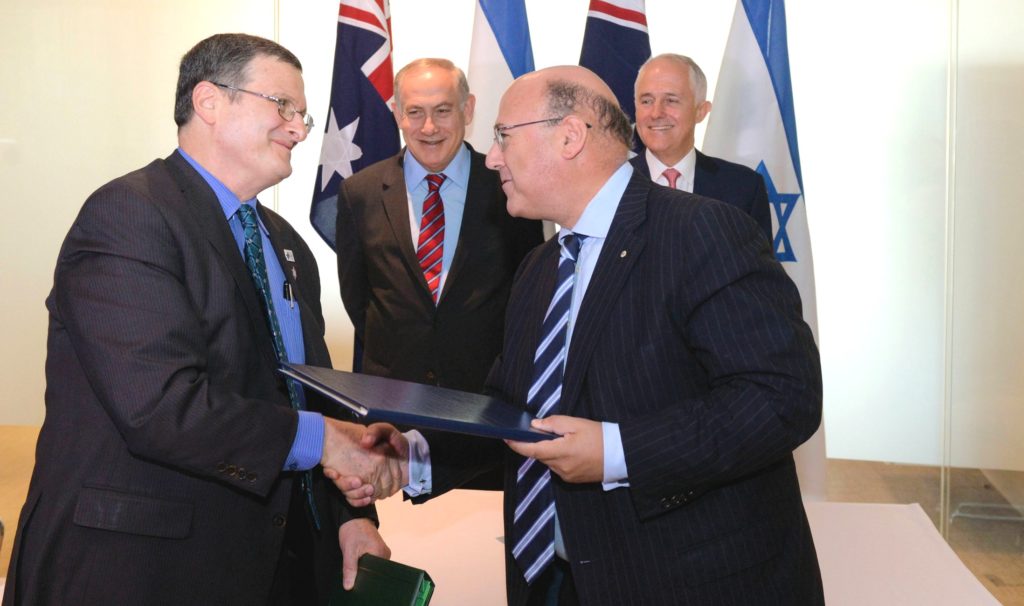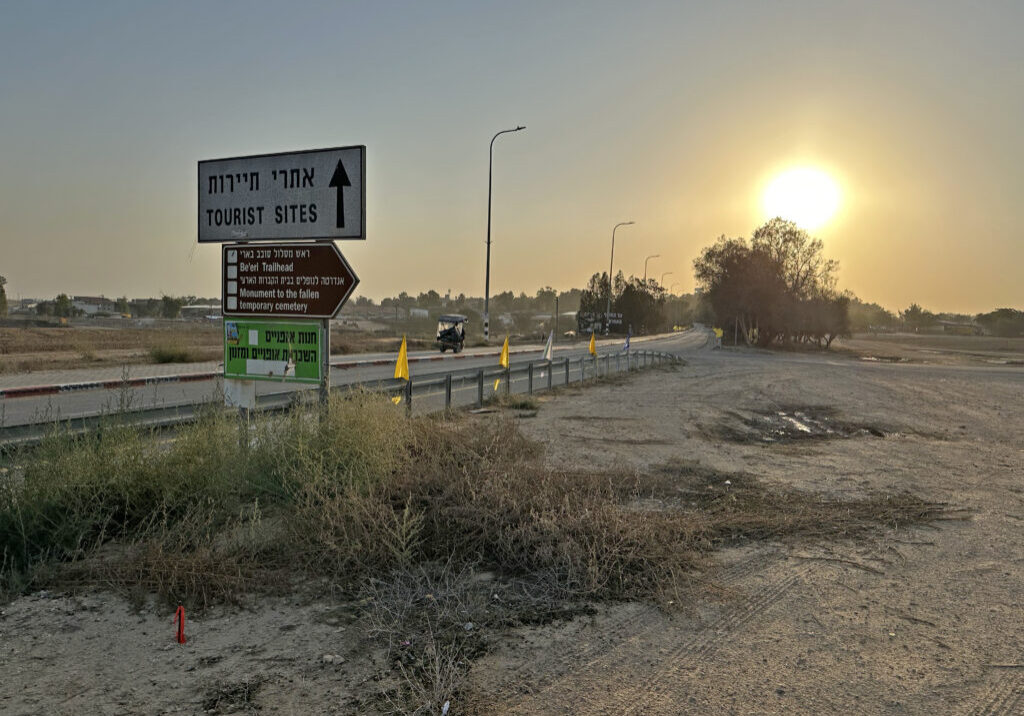Australia/Israel Review
Partners in Innovation
Aug 30, 2017 | Ross Beroff

A coming boom in Australia-Israel economic cooperation?
The Australian Government has an innovation agenda, and Israel, a small country halfway around the world may be the key to the goals of that agenda coming to fruition.
An article in the Sydney Morning Herald (May 16, 2016) noted that, “it might not be a well-known fact in Australia, but Israel has one of the highest concentrations of start-ups in the world and is widely recognised as a global leader in research and development.”
With new Israeli companies being listed on the Australian Stock Exchange (ASX) on almost a monthly basis, it seems doubtful that this widespread ignorance still exists or, if so, will continue to exist for much longer. In fact, there are currently 14 Israeli companies listed on the ASX, with more in the pipeline to be listed over the next 18 months. There are more than 15 Israeli companies considering an ASX listing, with three of them looking likely to list shortly. These companies coming to Australia represent a larger trend of improved trade relations and synergies between Israel and Australia in the innovation sector – a trend likely to prove beneficial to both countries, and to help put Australia on the map in terms of support for startups.
The majority of Israeli companies appearing on the ASX have listed there in just the past couple of fiscal years. Israel is now ranked sixth in terms of foreign countries with listings on the Exchange, but that ranking looks likely to change soon as more listings occur. This compares to New Zealand, which has 53 companies on the ASX – but for Kiwis, the ASX is the closest and obvious major exchange for a foreign listing, while for Israeli companies, the opposite is the case.
The Netanyahu Visit
In February of this year, Israeli Prime Minister Binyamin Netanyahu was the first sitting Israeli Prime Minister to visit Australia. This trip proved to be a catalyst for increased activity in the innovation sphere. A delegation of business representatives from various companies including from El Al and Mobilicom traveled with the Prime Minister. As part of the visit, Netanyahu and Prime Minister Turnbull agreed to a number of points, including to “explore opportunities for bilateral cooperation in the field of cyber,” and also signed an Agreement on Bilateral Cooperation in Technological Innovation and Research and Development. This went along with a commitment to “strengthen ties on education and innovation.” There were also commitments to explore opportunities for more cooperation in agriculture, water and energy related fields. Australia has already benefited greatly from Israeli technology through companies such as Netafim, which have transformed Australian agriculture, allowing it to expand in an unprecedented way.
Underscoring the impact of the Netanyahu visit, Ethy Levy, the Israel Trade Commissioner in Sydney, told the Australian Jewish News in a May 2017 article, “There are 10 others in the process of listing, boosted by the recent Israeli business delegation to Australia that came in February during Prime Minister Binyamin Netanyahu’s visit.”
Recent ASX Arrivals
Not long after the trip, Mobilicom, a technology company, listed on the ASX. The CEO of Mobilicom, Oren Elkayam, was quoted by the Australian Jewish News as saying, “small to mid-sized Israeli tech companies like [his] are increasingly viewing Australia as the ideal access point to stock exchange funding.” Further promoting the incentive of an Australian listing, he said, “…I believe there’s a great synergy between Israeli high-tech start-ups and the Australian market and business landscape through the ASX.”
The most recent Israeli company to be listed on ASX was G Medical Innovations, which appeared on May 10. When discussing the listing of G Medical Innovations, the CEO Yacov Geva echoed the thoughts of other entrepreneurs when he told the Australian, “Australia has the right economic conditions for innovative, high-growth companies, and we experienced a strong pull of Australian investors willing to back a company like ours.”
Some companies expected to list soon are Votiro and Cybergym. Both are cyber security and defence companies. Following plans of raising US$30 million for the ASX initial public offering (IPO) which would provide a post-money valuation of US$80 million, Cybergym announced plans to create a global HQ in Melbourne. This would directly create at least 60 local jobs within three years.
Not all companies are entering the market via the more typical method of an IPO. Instead, there is a large trend of Israeli companies looking to trade on the ASX using what is known as a reverse merger. In a reverse merger the company take over a “shell corporation,” that is already trading. Experts debate pros and cons of this, but is often not seen as the ideal way for quickly raising funds as a classic IPO might. This shows that the companies see having a strong presence in the Australian market as the most important aspect of becoming publicly traded in this country.
The recent and the expected IPOs underscore the core of the innovation economy between Israel and Australia having a large, though not exclusive, focus on technology and cyber. There are consistent trips from ASX representatives to Israel to sell local companies on why to list in Australia, as well as frequent delegations going both ways across various industries.
Trade Statistics
Based on information from the Australian Department of Foreign Affairs and Trade (DFAT), the two-way trade for goods and services is A$1.3 billion, which includes A$349 million in Australian exports and A$952 million in Israeli imports.
Additionally DFAT states that bilateral investment for 2015 – the most recent data available, totalled A$925 million. This is broken down into A$663 million in Australian investment in Israel and A$262 million for the reverse.
Some estimate that the bilateral trade is really closer to A$2 billion.
The trade is centered on livestock, aerospace and parts. Even with the higher alternative estimate, the numbers are still misleading and don’t show the full picture. This is in part due to classified defence spending/trade, of which there is a significant amount that cannot be accounted for. In addition, this does not take account of what is termed “tertiary trade”, based around Israel’s status as an R&D hub with a global focus. There are an estimated 250-300 major multinational corporations with research and development centres in Israel. This includes companies such as Microsoft, Samsung and Google. Many of the companies with R&D centres in Israel are headquartered elsewhere – typically the United States. This means that if a new product is developed in Israel, and then sold in Australia, the economic value of the trade would not be included when calculating the relations between the two countries, but is in reality vastly larger than any direct trade that is calculated.
Along with later-stage companies and the typically associated trade, there is also an increasing amount of startup investment – both directly through angel investors and venture capitalists as well as via what is known as equity crowdfunding. These investments are going both ways, with Australian-linked funds flowing into Israeli companies and Israeli-linked funds buying into Australian companies. Some of the interesting players in this field worth a closer look are OurCrowd and its affiliates, iAngels, Thorney Investment Group, and SquarePeg Capital. These are just a few examples that show how it is no longer just investment dollars flowing out of Australia and into Israeli/other foreign companies, but instead there is a two-way flow of funds which is having a longer term impact within Australia.
OurCrowd
OurCrowd is an Israel-based online platform, for equity crowd funding. It functions by recruiting, screening and selecting early-stage startups for inclusion on the platform, then directly invests up to A$55,000. It then aggregates investments from some of its currently 3,000 accredited investors, at a minimum of US$10,000 per startup. Most of the companies on the platform are Israeli startups, however there are also two Australian companies and one Australian fund so far.
The two Australian companies are Tapit and Global Kinetics Corporation. Tapit is an innovator in the field of contactless technologies like Near Field Communications (NFC) and Beacons (BLE). Global Kinetics Corporation creates wearable sensors and provides analytics for Parkinson’s disease research. These two Australian companies on the OurCrowd platform have raised through it US$1,181,865 and US$376,620 respectively. While the investors come from all over the world, the money invested is inextricably linked to Israel. Additionally, based on information available on the OurCrowd website, Our Innovation Australia Fund has aggregated A$38 million through the platform. This appears to be the majority of the total, as the Fund was revealed by the Australian Financial Review to have a A$50 million war chest. The fund, which has a lifespan of 13 years, has reportedly not yet deployed three quarters of the total.
OurCrowd receives voting equity as well as board representation as part of its deals. When speaking to the Australian Financial Review, OurCrowd Founder and CEO Jonathan Medved assuaged fears that the board influence could be used in a way that would negatively impact Australia by influencing its portfolio companies to relocate out of the country. Instead he stated that, contrary to that fear, in the Australian market, “the idea is to build long-term value here and I would hope that some of these companies would be global companies that would continue to be headquartered or have significant presences here.”
Other Israel-based investment in Australia
Medved is not the only industry expert who not only hopes but clearly expects that Australia will be a prime location for creating companies with a global presence. Founder of the recently Google-acquired company Kaggle, Australian native Anthony Goldbloom, had initially moved to the United States to build his company due to frustration with the lack of support and infrastructure available in Australia. However, when speaking to the Australian, he made it clear that he would be returning home to build his next company, as it is now more advantageous.
Based on its April 2017 shareholder update, investment powerhouse Gowing Bros has invested US$1.2 million into OurCrowd – which has been used across at least 20 different portfolio companies, as well as US$400,000 into Our Innovation Fund, making a total commitment of US$1.5 million.
Similar to OurCrowd is iAngels, another equity crowdfunding platform that is based in Tel Aviv. In a funding round led by Thorney Investment Group, iAngels raised US$14 million. In its first 18 months, 20% of the funds raised by iAngels came from Australians. One of the companies that Thorney Investment Group operates is Thorney Opportunities Ltd, which is publicly traded on the ASX under the ticker symbol of TOP. According to Finance Magnates, there are at least seven companies on the ASX in which TOP has major investments. This could possibly mean that, were iAngels to go public, it could potentially do so through an ASX listing.
Australian investment into Israeli companies cannot be discussed without at least mentioning Square Peg Capital. The firm’s offices alone exhibit how it is a connection point for the startup ecosystem in both current and up and coming innovation hubs. Currently it has Australian offices in Sydney and Melbourne as well as overseas offices in Boston and Tel Aviv. Its wide footprint makes it essentially geographically agnostic – it has and can make investments in three major countries on startups. Amongst its noteworthy investments are US$60 million in the Israeli freelancer marketplace company, Fiverr.
It is not just venture capital and angel investment funds that are seeing the benefits of dealing with Israel. Of the big four banks in Australia, all have sent representatives to Israel, and three out of the four are regularly sending delegations. Commonwealth Bank has even signed an agreement for collaboration with Israel’s Office of the Chief Scientist. Major Australian telecommunications firms have shown interest in Israel as well, with Telstra expanding its startup incubator there.
With recent cyber threats making the rounds, especially ransomware like Wannacry and Petya, there has been renewed interest in shoring up cyber-security. This has certainly assisted Votiro Cybersec’s local fundraising round prior to its IPO. Additionally, the focus of Commonwealth Bank’s collaboration with Israel’s Chief Scientist will be cyber-security.
Why Australia?
Israeli companies are realising there are multiple benefits of coming to Australia, and capitalising on them – leading more to come here. This creates a virtuous cycle which benefits both the Israeli and Australian economies.
They have been particularly attracted to the Australian Stock Exchange. The ASX is the ninth or tenth largest stock exchange in the world, depending on the metrics used. It is known as an excellent exchange for small to mid cap companies and is controlled by regulation that makes the Israeli firms and investors feel comfortable. These “smaller” companies can list on the main exchange for the country, rather than having to go to a secondary exchange as they may have had to do in other locations.
In some ways, Australian regulation is stricter than in Israel, and in others it is looser. For instance, Israel imposes limits on executive compensation, while there are none in Australia.
ASX investors are also used to higher risk companies, a description which applies to most tech companies, due to Australia’s relationship with often-risky small resource companies. Additionally there are numerous shell corporations available on the ASX that can be used in the popular reverse merger method.
Australia also provides an improved point of entry into Asian markets. This expands beyond just existing market ties, but also relates back to the political ramifications of being an Israeli company. Due to certain countries refusing to recognise Israel or to have diplomatic/economic ties with the country, many Israeli companies risk missing out on entire markets. By creating roots in Australia, and essentially becoming Australian entities, these Israeli companies can bypass these trade barriers and enter markets that would otherwise be closed to them. Furthermore, Australia’s population and similarities to other Western nations cause it to be seen as an effective test market.
As Medved mentioned, Australia is proving to be a good place to create global headquarters and a strong local presence. This is incentivised by cultural similarities between Australia and Israel, which is attractive for the workforce that may be brought over from Israel, and also provides for employment of locals – of which there are an increasing number that have the required marketable skills. The political stability and similar laidback lifestyle also promotes this relationship.
Barriers To Entry
Despite the many benefits of Israeli companies doing business with and/or moving to Australia, there are still many barriers to entry. The first of these is unlikely to be solved in the near future, but is becoming less problematic – the geographic distance. Frankly put, Israel is far from Australia, and even if direct flights (of which there has been much discussion of late) between the countries eventuate, the flights are still long and the time difference is vast, providing disincentives to entry.
From a purely economic standpoint, a large barrier to entry is the issue of double taxation. Currently there is no treaty dealing with this issue of multiple tax jurisdictions between Australia and Israel. However, as stated in a joint statement released by the respective Prime Ministers after Netanyahu’s visit to Australia, “they resolved to work towards concluding a Double Taxation Agreement which would remove tax impediments to bilateral economic activity and enhance the integrity of our respective tax systems.” Once such an agreement does come to fruition, there is likely to be an even greater influx of Israeli companies into Australia, with this major impediment removed.
Learning from Each Other
Besides the simple exchange of commercial activity, there is also much that the business communities of both nations can learn from each other. Israeli companies can improve corporate governance policies so as to be more aligned with Australia. Meanwhile, Australia is clearly looking to Israel to learn about how to create more of a start-up culture. It is doing so through various means, such as the inclusion of certain individuals on the Australia Innovation and Science Board. Included on this Board is Saul Singer, Israeli co-author of Start-up Nation: The Story of Israel’s Economic Miracle. Also on the Board is Paul Bassat who, through his firm Square Peg Capital, has a deep understanding of Israeli innovation.
As part of the innovation agenda, Australia has also created Landing Pads in specific locations that were “selected based on their status as a global innovation hub, their innovation and startup ecosystem, and their accessible network of entrepreneurial talent, mentors and investors.” Tel Aviv was amongst the five locations chosen. Additionally, major Israeli law firms, such as Gornitzky & Co. or Rosenberg Hacohen & Co. have been opening up Australia desks to assist companies that want to make the transition into the Australian market.
While much exchange has already occurred, this all appears to be just the start. In years to come, the innovation ties between Australia and Israel look set to grow exponentially as barriers are removed, and more individuals and companies see the benefits of cooperation and collaboration with their respective counterparts.






